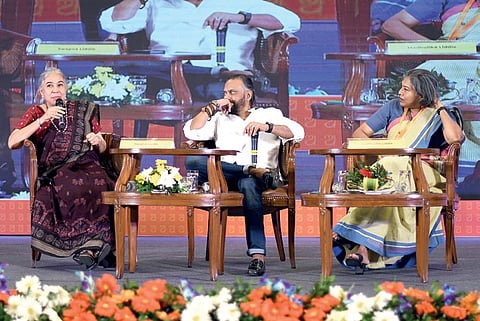

BHUBANESWAR: History is my first love, said author Swapna Liddle during a candid conversation with author and consulting editor of The Sunday Standard Ravi Shankar Etteth during the session ‘The Sisterhood of Words, History and Mystery’, on the first day of the 12th Odisha Literary Festival 2024, on Saturday.
Swapna was accompanied by her sister Madhulika Liddle, who is also an award-winning novelist and short story writer best known for her works in historical fiction.
As the session proceeded, the Liddle sisters gave the audience an insight into their rich body of work which has a slice of Delhi and Mughal era carefully woven into them. Speaking at length about the influence Delhi has on her writings, Swapna, who is also a heritage conservator, said she focuses on Delhi’s history in her works because she became interested in the cause of heritage protection.
“I started doing heritage walks in Delhi which is known to house many old monuments. In the course of time, I became interested in preserving those monuments which led me to read about the city’s history and that’s where my interest for writing about Delhi developed,” the author said.
The historian further said that her heritage walks are to raise awareness among the people about preservation of monuments. “That said, it does not mean that the difference can be palpably felt. Around 20 years ago, heritage was not something that figured in media stories but now people have started taking an interest in knowing their city and its history,” she said.
As the conversations flowed, Madhulika gave an insight into one of her most popular books, ‘Muzaffar Jang’ series which she said required her to do a lot of research. Set in 1656 Delhi, the series revolves around the character Muzaffar Jang who was a Mughal detective. “My inspiration for the character Muzaffar Jang arose partly from the fact that Delhi was the city I was most comfortable in. I wanted to write a historical detective because at that time not many wrote on that genre in India,” she added.
She said the reason she chose to weave her works around the Mughal era was because there are a lot of information available about it. “Through my books, I try to shed light on the social norms prevalent during that time, what people ate and how they dressed. So yes, there is a lot of research that goes into the works,” Madhulika said.
The author, however, pointed out that a lot of publishers these days are strict about word count so there is not much scope to give a detailed backdrop. “When somebody reads a book written by me, they get an idea about what I am saying about the past and on what basis I’m saying that. I use a lot of historical figures and weave my narrative around them so that people could look at the past a little differently,” the writer concluded.